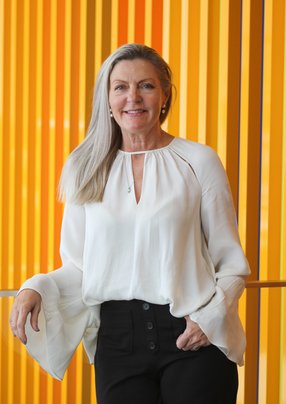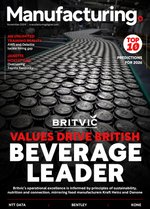Corinne Burrows, VP of Global Manufacturing at Japan Tobacco International (JTI) says the defining quality of leadership is leaving a legacy of positive change.
“I don’t want to exit the workplace seeing the same statistics, the same behaviours and the same environment as when I entered it,” she says.
“This drives me to try to make a difference in what I do.”
And what a difference that is, profoundly shaping JTI’s manufacturing strategy and sustainability journey.
Corinne understands that leadership is a sustainability challenge, too. As the manufacturing sector struggles with hiring and retention, creating places where the next generation wants to work is of paramount importance.
Leadership and sustainability are one and the same – both intrinsically linked to manufacturers' fate and future competitiveness.
Corinne is embracing this at JTI, creating a culture of support, respect and challenge while pursuing a sustainable manufacturing strategy.
What was your journey like to JTI?
I was always interested in maths, physics and chemistry at school. I can remember being told by my head teacher that engineering was not a profession for a young lady. I decided that if that really was the case, I definitely wanted to do it.
I did a mechanical engineering apprenticeship in the defence industry in the UK and then switched to the consumer goods industry. I worked in my previous role for 25 years before retiring to spend time with family.
Then, guess what? COVID-19 happened. So, for the next seven months, I was locked down in the UK, having a very family-centric summer. When the kids went back to school and things started to return to normal life, I thought ‘okay, what am I going to do next?’
That’s when I was headhunted by JTI. I learned about its vision for the supply chain and loved it, knowing I had the experience to match. So, I came back to work in the middle of COVID-19 and it was 10 months until I met anyone face-to-face.
JTI has the collegiate, supportive culture which made this possible. I’ve been here for four years now and I feel like I've been here much longer than that. It’s like I'm having my second career with JTI.
What does compelling leadership look like?
There’s two things I really value: honesty and the capacity to simplify.
Being direct and honest with people is vital to their development and success. It has to be done with positive intent, where you want to help them succeed, not criticise. With this approach, people will take on board your honest feedback.
The super leaders I’ve seen in the past also have a fantastic ability to simplify very complicated problems and tasks into bite-sized chunks. This way things get moving – you get action and resolution by tackling things one at a time.
I love the approach we have at JTI, where we embrace incremental improvement and experimental approaches. With feedback, we move forward and combat being paralysed by uncertainty. There are lots of unknowns along the way in any workplace and that capacity to simplify and start working on a problem makes such a difference.
What are you like as a leader?
My role as a leader is about stretch and support. I stretch my team, I give them space to grow upward, to take on more responsibility, to make decisions and develop but I’m also there to guide them. This creates a culture where people feel empowered to take on new challenges and know, regardless of the result, they will be supported.
I’m an extrovert: I draw my energy from having other people around me and I’m always invested in hearing the views and perspectives of my team.
That togetherness and collective action is what I enjoy and it's why I get up so happy to go to work, knowing I’ll be working with great people to achieve great things.
Why is leadership an important sustainability concern?
When we think about sustainability, we often think about reducing environmental impact, reducing our CO2 emissions and evaluating product life cycles, tackling the areas that impact people and the planet.
But there’s also a part of sustainability that is directly about people: giving employees the opportunity to progress their careers and build their skills. So it goes beyond the ESG-type rhetoric you see in a lot of integrated reports.
Attracting and retaining the right talent for the future is a big sustainability priority. I see my children growing up and I wonder what kind of workplace they will arrive at.
To be a modern company, the kind of company that young people want to join, we have to expand beyond decision-makers because they are not the demographic that will be leading the company in the future.
We want people to have psychological safety, the freedom to challenge and the freedom to be themselves in an inclusive place where diversity of people and opinions are valued.
JTI really is a cultural North Star in this regard – a place where people can enjoy the workplace and give their best.
What questions do manufacturers need to ask today about sustainability?
When I first entered the workplace, not a lot of thought was given to environmental impacts.
Sustainability has developed rapidly and each year we participate in external benchmarking to ensure the bar is raised. We know progress is expected and that pushes manufacturers to prepare for a more sustainable future.
For example: a question that multinationals will need to continue to assess is the balance between globalisation and nearshoring. Ten or 20 years ago, we wanted to globalise everything. I think now, we're taking a slightly different approach where we have to understand the balance between the logistics and transportation emissions versus our operational emissions.
This plays into broader geopolitics where we need to be able to anticipate market needs and engage in long-term planning to stay sustainable, asking ourselves what the shifts are going to be and what our strategic plan is.
How has JTI become more sustainable?
In our global supply chain we’re targeting sustainability in our own operations and our distribution and logistics network. At the JT group level we’ve signed up for the Science-Based Targets initiative and are aiming to be carbon neutral by 2030 and net zero by 2050.
We also track our activity and actions at the Group level against Scope 1, 2 and 3 emissions and are signed up to the Dow Jones Sustainability Index and to the Carbon Disclosure Projects.
We've made some good improvements. We've reduced our CO2 emissions from our own operations since 2019 by 19%, we've seen a 29% reduction in water consumption and we have increased the amount of recyclability and reusability in our packaging by 88%.
We have big ambitions and plans as to what else we will do in the future. Something driving these plans is the introduction of an internal carbon pricing mechanism, which has allowed us to assess our investments beyond financial payback, taking into account environmental impact.
This is critical as a big part of what we're doing is investing in technology and projects which reduce emissions.
We have a fantastic project in our factory in Trier, Northern Germany where we've invested in a solar wind park, and in collaboration with local authorities and another private company, use it to generate a significant deal of our electricity.
We’ve also got projects in both Europe and the Americas to optimise our supply chain network to reduce transport emissions. We’ve really embraced digitalisation to model the network and enable decisions.
How are you creating sustainable factories at JTI?
We’ve improved the efficiency of our factories by 10% in the last four years through improvements in productivity.
We’ve adopted the Integrated Work System (IWS), a holistic programme that not only helps professional development by introducing people to new knowledge and skills but also focuses on loss elimination.
The programme’s predictive type models are helping us drive greater efficiency. Through this methodology, we have reduced our use of natural resources, increased the performance of our factories and supported our staff with additional training and the empowerment they need to identify losses, reduce waste and improve machine performance.
We also use digital twin and network modelling tools to determine ideal locations and warehouse numbers to reduce the miles our product must travel. Through our machine learning tool, which observes and optimises our sales forecast, we’re also reducing waste throughout the supply chain.
We’ve pursued greater photovoltaic investment as well, utilising solar-generated power in factories for a significant proportion of our electricity. We’re also looking towards AI for its capacity to create more sustainable operations, in terms of both factory operations and network design.
We’re always searching for new opportunities to be more sustainable, both in terms of how we operate and how we develop our staff.
To read the full story in the magazine please click HERE
Make sure you check out the latest edition of Manufacturing Digital and also sign up to our global conference series - Manufacturing & Mobility LIVE 2024
Manufacturing Digital is a BizClik brand.
- Can Carton Waste Revolutionise Sustainable Manufacturing?Sustainability & ESG
- Inside LEGO's New Sustainable Product Development HubSustainability & ESG
- JTI: What Gender Agnostic Leadership Looks LikeProduction & Operations
- Normative: Carbon-reduction in Supply Chain ManufacturingSustainability & ESG



